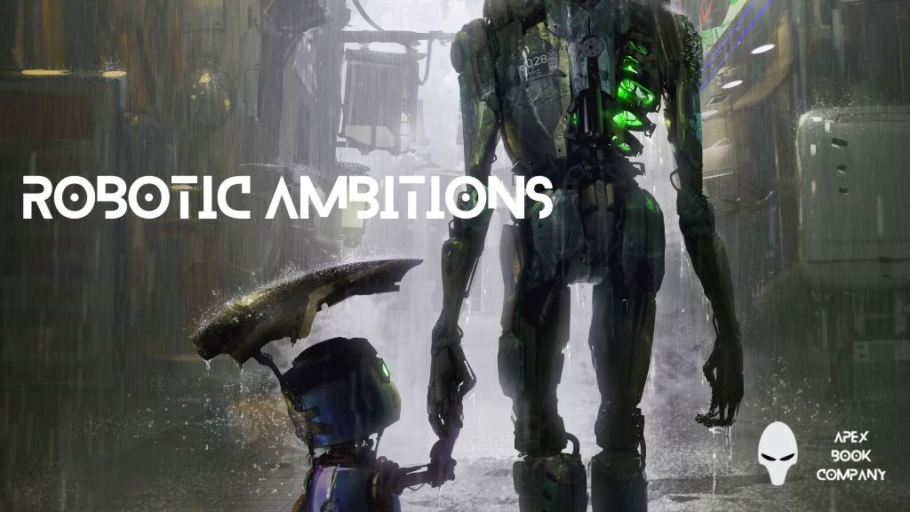
In a bit of excellent timing, given that AI is all over the news these days, Apex Magazine launched a Kickstarter today for a new anthology of fiction about robots, called Robotic Ambitions. The anthology, to be clear, is about robots, not written by robots. It’s written by humans.
Apex is looking to raise a minimum of $12,000 to fund this anthology, which will go toward paying the cover artist, authors, and editors, as well as covering production costs such as graphic design, layout, copy edits, and typesetting. This also covers fulfilling backer rewards.
After the anthology is funded, submissions will open on March 13, with the first week set aside for writer of color and members of the LBGTQ+ community. Apex pays $0.08 per word and there’s a limit of 5,000 words per story. Simultaneous submissions are allowed, but all stories must be related to theme of aspects of emerging consciousness, artificial intelligence, and the mobilization of human-created entities. Full guidelines can be found here.
AI-written or assisted stories are not eligible for inclusion in the anthology.
The anthology is edited by Lesley Conner and Jason Sizemore, who are co-editors of Apex Magazine.
“Whether striving to protect the family they’ve chosen, searching for meaning amid the chaos of the world, or questioning what it is that makes one alive, robotic ambition can mean many different things,” said Sizemore. “This anthology will explore the nuance of sentience manufactured and evolved within mechanical beings.”
MetaStellar‘s E.E. King and Andrea Goyan, co-hosts of our YouTube segment Long Lost Friends, recently interviewed Jason Sizemore for the MetaStellar YouTube channel. Watch the full video below:

MetaStellar editor and publisher Maria Korolov is a science fiction novelist, writing stories set in a future virtual world. And, during the day, she is an award-winning freelance technology journalist who covers artificial intelligence, cybersecurity and enterprise virtual reality. See her Amazon author page here and follow her on Twitter, Facebook, or LinkedIn, and check out her latest videos on the Maria Korolov YouTube channel. Email her at maria@metastellar.com. She is also the editor and publisher of Hypergrid Business, one of the top global sites covering virtual reality.


It’s becoming clear that with all the brain and consciousness theories out there, the proof will be in the pudding. By this I mean, can any particular theory be used to create a human adult level conscious machine. My bet is on the late Gerald Edelman’s Extended Theory of Neuronal Group Selection. The lead group in robotics based on this theory is the Neurorobotics Lab at UC at Irvine. Dr. Edelman distinguished between primary consciousness, which came first in evolution, and that humans share with other conscious animals, and higher order consciousness, which came to only humans with the acquisition of language. A machine with primary consciousness will probably have to come first.
What I find special about the TNGS is the Darwin series of automata created at the Neurosciences Institute by Dr. Edelman and his colleagues in the 1990’s and 2000’s. These machines perform in the real world, not in a restricted simulated world, and display convincing physical behavior indicative of higher psychological functions necessary for consciousness, such as perceptual categorization, memory, and learning. They are based on realistic models of the parts of the biological brain that the theory claims subserve these functions. The extended TNGS allows for the emergence of consciousness based only on further evolutionary development of the brain areas responsible for these functions, in a parsimonious way. No other research I’ve encountered is anywhere near as convincing.
I post because on almost every video and article about the brain and consciousness that I encounter, the attitude seems to be that we still know next to nothing about how the brain and consciousness work; that there’s lots of data but no unifying theory. I believe the extended TNGS is that theory. My motivation is to keep that theory in front of the public. And obviously, I consider it the route to a truly conscious machine, primary and higher-order.
My advice to people who want to create a conscious machine is to seriously ground themselves in the extended TNGS and the Darwin automata first, and proceed from there, by applying to Jeff Krichmar’s lab at UC Irvine, possibly. Dr. Edelman’s roadmap to a conscious machine is at https://arxiv.org/abs/2105.10461
It’s been less than a day, and Apex is already more than a third of the way to their goal:
https://www.kickstarter.com/projects/apexpublications/robotic-ambitions
Congrats!